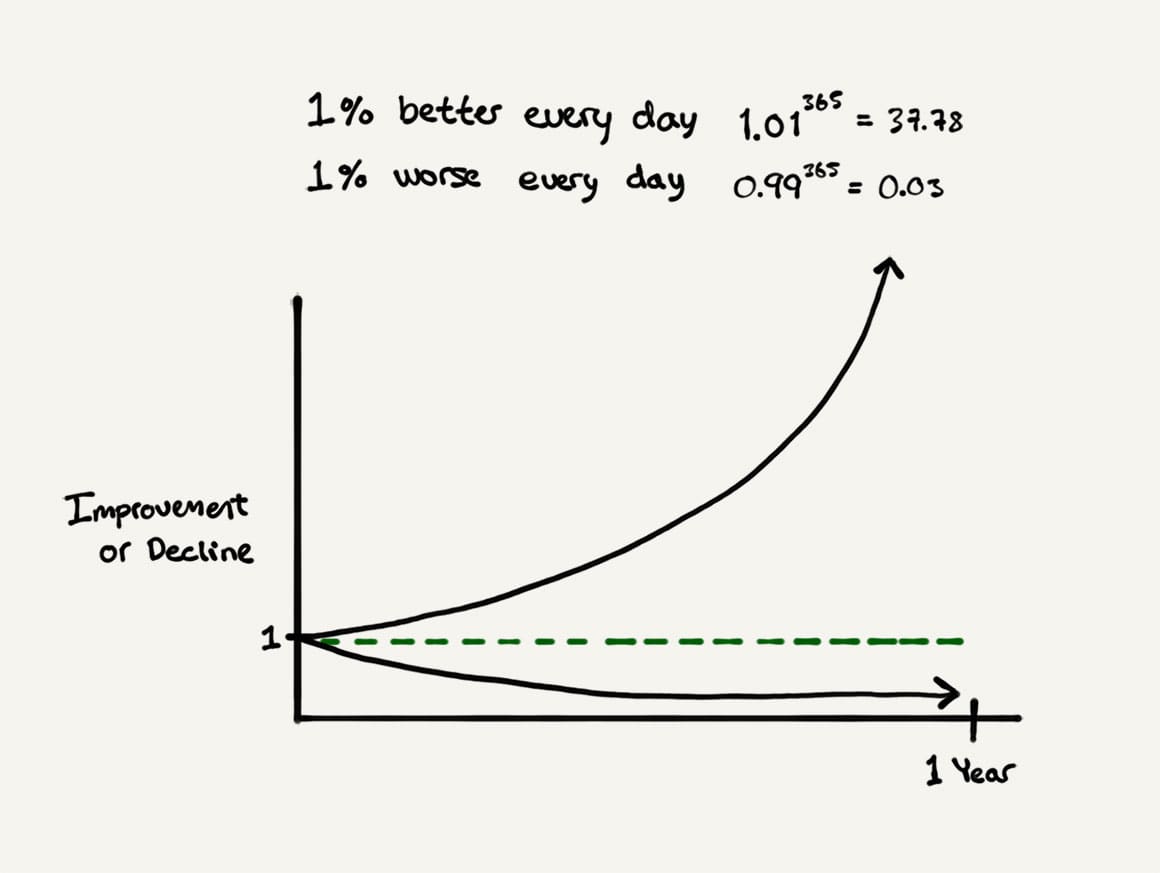Albert Camus famously said: Life is the sum of all your choices.
It’s true. And every single one of those little choices might have a bigger impact down the line than one might initially think.
This is the key point of James Clear’s book, Atomic Habits. Clear talks about the long game and how every little choice affects the compounding of the path to one’s desired goals. Just like atoms are fundamental units of larger systems, habits are basically the atoms of our lives. They are little patterns that we repeat, and over time they bring significant and ever-increasing compound interests of self-improvement.
To understand the power of the little things, imagine you’re in an airplane leaving Los Angeles and you’re heading to New York. The airplane is on the runway pointing exactly straight to New York and the pilot only has to fly across without turning the plane. He could sleep if he wanted to. Now, let’s say something was to shift the nose of the airplane just a tiny 3.5 degrees on the runway before takeoff. You wouldn’t even notice it. But, you would end up in Washington, DC instead of New York.
Like those tiny 3.5 degrees shifts in the nose of the airplane, one of Clear’s arguments is that just a 1% improvement in making choices inevitably leads to remarkable things down the line. It’s because compounding is a fundamental law (and a vital mental model). Clear writes:
Here’s how the math works out: if you can get 1 percent better each day for one year, you’ll end up thirty-seven times better by the time you’re done. Conversely, if you get 1 percent worse each day for one year, you’ll decline nearly down to zero. What starts as a small win or a minor setback accumulates into something much more.
For everyday choices, there seems to be no difference between making one that is 1 percent better or 1 percent worse. Choosing to skip that single beer for a glass of water feels like an insignificant action at the time. And it actually is. But what starts small compounds into something more. The rewards come with delayed gratification – big time – when the right choices are made time after time. Warren Buffett has said that chains of habit are too light to be felt until they are too heavy to be broken.
What’s important is to make that chain a healthy one.
This is the thing about playing the long game. You barely even notice it. It’s boring to think about the long game. We often pressure ourselves to make some life-changing improvement that everyone will notice. We tend to falsely think that this is how successful people make their breakthroughs.
Therefore, it’s easy to dismiss the power of simple choices even though it might be the simple choices that matter the most. It’s the collective choices that significantly increase one’s odds of getting the occasional, huge opportunity.
Benjamin Franklin – the hero behind this business – said:
Diligence is the mother of good luck.
Thomas Jefferson said something similar:
I am a great believer in luck, and I find the harder I work, the more I have of it.
The real problem is that our brains are not wired to think in terms of compounding effects. Our primal need to survive meant we had to live in the here and now. Historically, that made way more sense than it does today. During the Roman Empire, the average life expectancy was 25 years. By the Middle Ages, it had reached 33, and by the early 1900s, people lived to about 55.
We’ve come a long way since then and the choices we make early on have significantly bigger repercussions. But because of how our brains are wired, to even consider the long game we have to take a mental leap. But if we do take that mental leap, the results can be extraordinary and exceed every expectation.

We’ve now established that the small choices we make determine the trajectory of life – like the plane heading to New York. We know habits matter. But as Clear states, it’s not enough just to be aware of the fact. We must nudge ourselves in the right direction.
Habits Are Functions of Systems
So often, we’re ambitious, set these lofty goals for ourselves, and then we wonder why it doesn’t work out. The reason is that there’s no system behind those goals. A system that ensures that all the little compounding choices are just right. To get things done, it’s much better to create systems of habits than relying on motivation because motivation itself ebbs and flows.
“We do not rise to the level of our goals, we fall to the level of our systems.”
– James Clear
In the book, Nudge, Richard Thaler and Cass Sunstein talk about the use of paternalism – or choice architecture – for designing environments to positively influence choices within groups. This idea has had quite an impact on social policy. And the great thing about nudging is that anyone can apply it individually to their own lives. One doesn’t have to be the victim of one’s environment. One can also be the architect of it.
The key to designing the environment in a way that actually works for sustaining habits is to scale the desired habit down to the smallest, simple thing.
- Want to read 20 book pages every night? Leave a book on your pillow every day you wake up and make your bed.
- Want to drink more water and less alcohol? Make water the default choice by having nothing else in the fridge.
- Want to save more money? Automate your savings transfers and keep the savings account at a different bank than your checking account.
- Want to practice more guitar? Place it right in the center of your living room.
Forming the right habits is really all about thinking ahead to the second-order consequences of even the smallest choices and decisions. Secondly, it’s about creating the right system to make them incredibly easy to start and impossible to fail.
Now, lastly, the question becomes: What habits are the best to pick up in order to achieve success in life? Well, I know how I go about it. I look to the heroes of mine who achieved the same goals I am set out to achieve. I then figure out their healthy habits and try to instill them in my life. It’s so simple.
Bill Gates once said:
“Most people overestimate what they can do in one year and underestimate what they can do in ten years.”
That’s exactly right.


